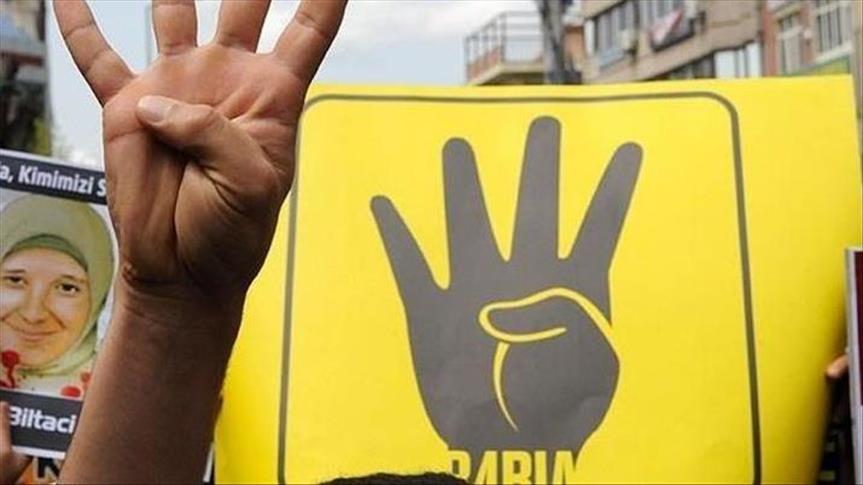Ban on Rabaa sign fails to dispirit Egypt's revolutionaries
Despite draft law banning Rabaa symbol, revolutionaries still plan to make four-finger salute during protests marking 5th anniversary of Egypt's Jan. 25 uprising

Egypt
CAIRO
An Egyptian government move to outlaw a four-fingered salute -- used by supporters of ousted President Mohamed Morsi to commemorate hundreds of demonstrators killed in 2013 -- has failed to discourage protesters.
"Whether they criminalize it or not, we’re going to use the Rabaa salute to remember our dead," Hussein, a university student who declined to give his last name, told Anadolu Agency.
Last week, the Egyptian cabinet approved a draft law aimed at criminalizing the promotion and the distribution of stickers, posters or photographs that allegedly promote "terrorist" groups.
According to the draft law, anyone found guilty of posting, possessing, producing or promoting symbols associated with "terrorist" organizations will be "jailed and fined a minimum of 10,000 Egyptian pounds and a maximum of 30,000 Egyptian pounds."
The Rabaa symbol -- a hand with four fingers extended -- has been used by anti-regime protesters to express their opposition to President Abdel-Fattah al-Sisi, a former army chief who ousted Morsi in a 2013 coup.
Shortly after Morsi’s ouster, on Aug. 14, 2013, hundreds of his supporters were gunned down when security forces violently cleared their sit-in protest, which was held in eastern Cairo's Rabaa al-Adawiya Square.
Ever since, the hand gesture has been a common feature of pro-Morsi anti-coup demonstrations in Egypt.
The Egyptian authorities, for their part, say protesters who give the four-fingered salute are members of Morsi’s now-outlawed Muslim Brotherhood group.
The Egyptian government banned the Brotherhood in late 2013 and declared it a "terrorist organization."
Since Morsi's overthrow, Egyptian authorities have waged a harsh crackdown on his supporters and members of his Muslim Brotherhood group, killing hundreds and arresting tens of thousands.
‘Won’t be silent’
Nevertheless, Hussein said he plans to raise the Rabaa salute during rallies planned for next week to mark the fifth anniversary of a popular uprising that ousted autocratic president Hosni Mubarak in 2011, paving the way for Morsi’s election one year later.
"The authorities have spared no effort to efface the Rabaa massacre from public memory," he said, citing a recent government decision to change the name of Rabaa al-Adawiya Square, in which the carnage took place.
Last year, the government renamed the square after former Public Prosecutor Hesham Barakat, who had been killed by a car bomb shortly before.
"Despite their efforts, we won’t be silent until we break this coup," a defiant Hussein asserted.
The Muslim Brotherhood has called on supporters to take to the streets on Jan. 25 to mark the fifth anniversary of the 2011 revolution.
In a statement, the group called on the Egyptian people "to rally for the salvation of the January 25 Revolution and topple the ruling regime".
In the run-up to the anniversary, a number of Egyptian activists have used social media to recall their participation in the 2011 uprising that ultimately felled the Mubarak regime.
Activists have launched a Twitter hashtag -- "#I participated in January revolution" -- to express their pride in having taken part in the uprising five years ago.
To the regime’s discomfort, the hashtag has been among Egypt’s top trenders in recent days.
Symbol of freedom
Hani Khalil, a university student, said government attempts to criminalize the Rabaa salute would not affect activists’ plans to mark the uprising’s anniversary.
"The Rabaa sign has come to symbolize all those who seek an end to tyranny and injustice," he said.
Rabaa al-Adawiya Square was originally named after a pious Muslim woman named Adawiya who lived in the eight century. Since she was her family’s fourth child, the Arabic word for "fourth" -- "Rabaa" -- was affixed to her name.
Rabaa al-Adawiya is also associated with the struggle for freedom, so -- within the context of Egypt’s anti-coup movement -- her name has come to give birth to a new symbol.
The Rabaa sign first appeared after Turkish activists opposed to Egypt’s 2013 coup launched a website -- "R4bia.com" -- and a Twitter hashtag -- "Whatisr4bia" -- in support of ousted President Morsi and his supporters.
Since then, several prominent personalities have used the salute to show solidarity with Egypt’s anti-coup movement, including Turkish President Recep Tayyip Erdogan, who has continued to denounce Morsi’s ouster.
Egypt has been roiled by five years of political turmoil since Mubarak, following an 18-day popular uprising, was forced to step down in February of 2011.









